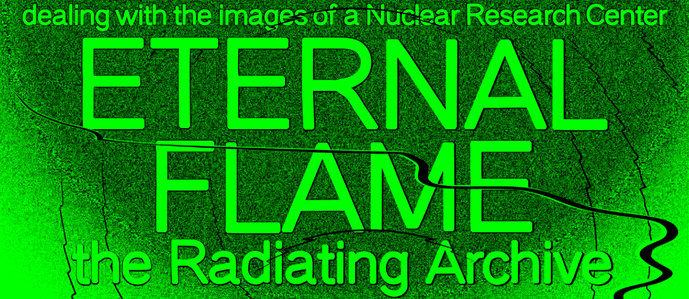

With Moritz Appich, Mustafa Emin Büyükcoşkun, Cécile Kobel, Judith Milz, Rayna Teneva
20.10 - 18.11.2022
Vernissage: Thursday, 20.10.22, 6:30 p.m.
In 1956, the first nuclear research center (KfK) in Germany was built north of Karlsruhe in the middle of a vast forest. More than 5000 people worked at KfK, a sealed-off and fenced facility. For over 50 years, professional photographers documented what happened on site, adding up to an image conglomerate of 210,000 photographs and films. They show what seems to be expected: fuel rods, decay pools, waste drums, architecture and machines that are so large that a person can hardly be recognized as such next to them. But one also finds the familiar, through which - in the context of nuclear research - one embarks on an uncanny journey: Images of social interactions, atomic euphoria, dance events, buffets, animals, sports festivals.
The visual richness and variety of subjects that have accumulated over the years at the research center form a multi-faceted archive. Science, progress and everyday events and accidents: these are images that are part of the historical context of the reconstruction of post-war Germany, imbued with an undoubted faith in the future, driven and accompanied by a nuclear euphoria.
In the late 1970s, the growing importance of environmental movements marked the beginning of an ideological shift in the country. It was a development that eventually led to Germany's abandonment of nuclear power generation and the complete shutdown and decontamination of reactors. In this context, the Nuclear Research Center practically dissolved as a structure and its facilities were absorbed into the Karlsruhe Institute of Technology (KIT). Also its picture archive.
However, it seems that it was precisely this paradigm shift that enabled the archive to "open up." In 2017, the decision was made to digitize ten percent of the image archive. This enabled, in the changed political climate, a critical discourse - not only about the German anti-nuclear position, but also about nuclear neighborhoods and the global web of nuclear threats. Since the archive has been open to the public, it has become the starting point for numerous artistic investigations, exhibitions, and publications that seek to describe and visualize the afterlife of nuclear research.
In the context of the exhibition "Eternal Flame - The Radiating Archive", the archive legacy is understood as a cosmos in which artists* engage with its visual regime. They are united in an attempt to interpret, translate and understand the politics of images in the context of the Cold War, the post-war period in West Germany and beyond. The artistic approaches juxtapose different methods of dealing with the archival materials as well as a wide range of questions about the documentary character of the archive - from the speculation of being able to create future facts with fiction to the recognition of a contaminated reality and existential consternation in which we already live.
In this respect, the process of digitization has been part of the "thawing" of images, their decolonization from the analog past - from celluloid via digital technology back to other material forms. The KIT Archive is currently physically freezing its collection at -18 degrees to protect the original negatives from decay. The final disposition of KfK's material legacy - radioactive waste - remains an ongoing endeavor, with many key factors still unresolved. Unlike the archived images, the final disposal of the residues from nuclear research does not allow for individual solutions: it will inevitably be a challenging task for future generations.
The exhibition will feature two installations, Images from Past Future and Let me have my cake (and eat it too), which emerged from an engagement with the archive, as well as the publication 10%. Bildarchiv eines Kernforschungszentrums concerning the image archive of a nuclear research center, which is the result of a cooperation between the Karlsruhe University of Arts and Design and the KIT - Karlsruhe Institute of Technology.
On Saturday, 22.10, an open (atomic) afternoon with a presentation and discussion in cooperation with the photo book platform "PUK!" will take place in the presence of the artists and designers.
"Eternal Flame - The Radiating Archive" is a collaboration between Moritz Appich (graphic designer), Mustafa Emin Büyükcoşkun (artist), Cécile Kobel (graphic designer), Judith Milz (artist) and Rayna Teneva (artist), who studied at the same time at the Hochschule für Gestaltung in Karlsruhe.
Moritz Appich (1996) and Cécile Kobel (1991) both live and work as graphic designers in Berlin. Moritz is part of the type design studio and label Gruppo Due, Cécile is one half of the studio KaranKobel, which develops and designs visual concepts for musicians, biennials and artists. Mustafa Emin Büyükcoşkun's (b. 1988, lives in Karlsruhe/Istanbul) work is concerned with agency and the potential of truth (discovery) in media, especially sound. His current practice shifts the context of still and moving images, deconstructs meta-narratives and decolonizes historiographic practices. Judith Milz (*1989, lives in Karlsruhe/Marseille) develops narrative possibilities in her artistic work in sculptural, performative, photographic and journalistic contexts. Archives often serve as a starting point to weave documentary material with context-specific concepts and performative elements. Rayna Teneva (b. 1986, lives in Sofia) is an art maker who uses archives, found media, and sound to facilitate narratives that speculate on memory, identity formation, and future predictions. Her work is process-oriented and often draws on performative and socially-integrative gestures.
"Eternal Flame - The Radiating Archive" is part of the project "Untitled (Archive)" which emerged in 2017 from a collaboration between the KIT Archive (Klaus Nippert, Elke Leinenweber) and the Karlsruhe University of Arts and Design (Susanne Kriemann, Friederike Schäfer).
More info: https://www.goethe.de/ins/bg/de/ver.cfm?event_id=24213344